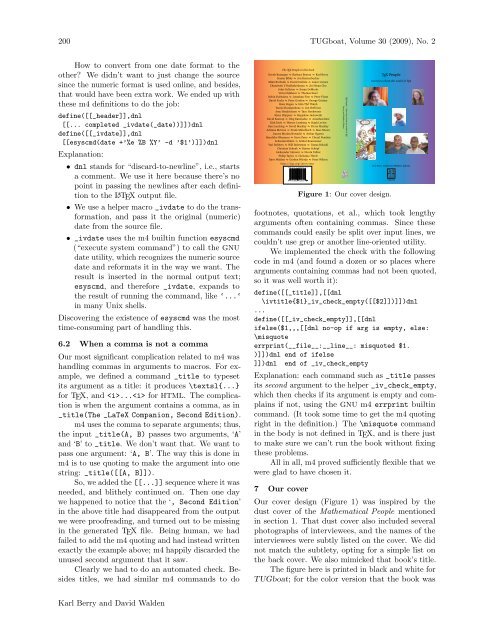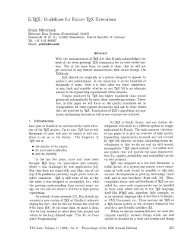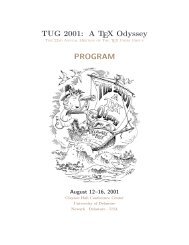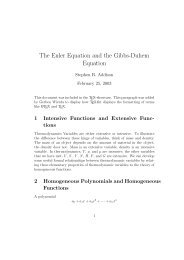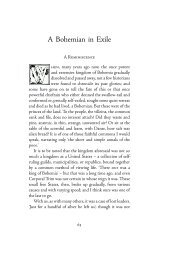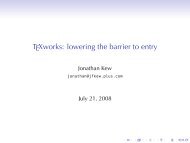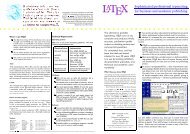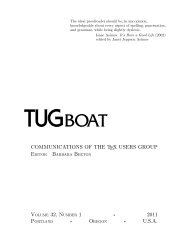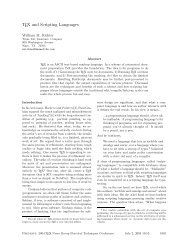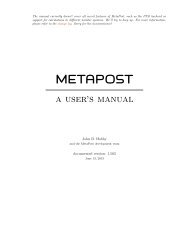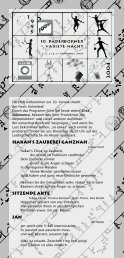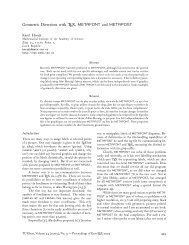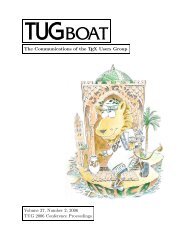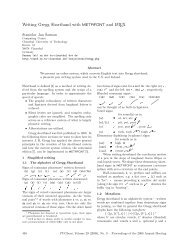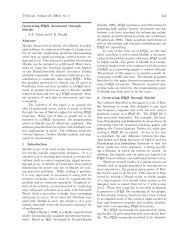The Communications of the TEX Users Group Volume 30 ... - TUG
The Communications of the TEX Users Group Volume 30 ... - TUG
The Communications of the TEX Users Group Volume 30 ... - TUG
Create successful ePaper yourself
Turn your PDF publications into a flip-book with our unique Google optimized e-Paper software.
200 <strong>TUG</strong>boat, <strong>Volume</strong> <strong>30</strong> (2009), No. 2<br />
How to convert from one date format to <strong>the</strong><br />
o<strong>the</strong>r? We didn’t want to just change <strong>the</strong> source<br />
since <strong>the</strong> numeric format is used online, and besides,<br />
that would have been extra work. We ended up with<br />
<strong>the</strong>se m4 definitions to do <strong>the</strong> job:<br />
define([[_header]],dnl<br />
[[... completed _ivdate(_date))]])dnl<br />
define([[_ivdate]],dnl<br />
[[esyscmd(date +’%e %B %Y’ -d ’$1’)]])dnl<br />
Explanation:<br />
• dnl stands for “discard-to-newline”, i.e., starts<br />
a comment. We use it here because <strong>the</strong>re’s no<br />
point in passing <strong>the</strong> newlines after each definition<br />
to <strong>the</strong> L A<strong>TEX</strong> output file.<br />
• We use a helper macro _ivdate to do <strong>the</strong> transformation,<br />
and pass it <strong>the</strong> original (numeric)<br />
date from <strong>the</strong> source file.<br />
• _ivdate uses <strong>the</strong> m4 builtin function esyscmd<br />
(“execute system command”) to call <strong>the</strong> GNU<br />
date utility, which recognizes <strong>the</strong> numeric source<br />
date and reformats it in <strong>the</strong> way we want. <strong>The</strong><br />
result is inserted in <strong>the</strong> normal output text;<br />
esyscmd, and <strong>the</strong>refore _ivdate, expands to<br />
<strong>the</strong> result <strong>of</strong> running <strong>the</strong> command, like ‘...‘<br />
in many Unix shells.<br />
Discovering <strong>the</strong> existence <strong>of</strong> esyscmd was <strong>the</strong> most<br />
time-consuming part <strong>of</strong> handling this.<br />
6.2 When a comma is not a comma<br />
Our most significant complication related to m4 was<br />
handling commas in arguments to macros. For example,<br />
we defined a command _title to typeset<br />
its argument as a title: it produces \textsl{...}<br />
for <strong>TEX</strong>, and ... for HTML. <strong>The</strong> complication<br />
is when <strong>the</strong> argument contains a comma, as in<br />
_title(<strong>The</strong> _LaTeX Companion, Second Edition).<br />
m4 uses <strong>the</strong> comma to separate arguments; thus,<br />
<strong>the</strong> input _title(A, B) passes two arguments, ‘A’<br />
and ‘B’ to _title. We don’t want that. We want to<br />
pass one argument: ‘A, B’. <strong>The</strong> way this is done in<br />
m4 is to use quoting to make <strong>the</strong> argument into one<br />
string: _title([[A, B]]).<br />
So, we added <strong>the</strong>[[...]] sequence where it was<br />
needed, and bli<strong>the</strong>ly continued on. <strong>The</strong>n one day<br />
we happened to notice that <strong>the</strong> ‘, Second Edition’<br />
in <strong>the</strong> above title had disappeared from <strong>the</strong> output<br />
we were pro<strong>of</strong>reading, and turned out to be missing<br />
in <strong>the</strong> generated <strong>TEX</strong> file. Being human, we had<br />
failed to add <strong>the</strong> m4 quoting and had instead written<br />
exactly <strong>the</strong> example above; m4 happily discarded <strong>the</strong><br />
unused second argument that it saw.<br />
Clearly we had to do an automated check. Besides<br />
titles, we had similar m4 commands to do<br />
Karl Berry and David Walden<br />
<strong>The</strong> <strong>TEX</strong> People in this book<br />
Kaveh Bazargan≈Barbara Beeton≈Karl Berry<br />
Duane Bibby≈Jon Breitenbucher<br />
Mimi Burbank≈David Carlisle≈Lance Carnes<br />
Chandroth V Radhakrishnan≈Jin-Hwan Cho<br />
John Culleton≈Susan DeMeritt<br />
Victor Eijkhout≈Thomas Esser<br />
Robin Fairbairns≈Jonathan Fine≈Peter Flynn<br />
David Fuchs≈Peter Gordon≈George Grätzer<br />
Hans Hagen≈Hàn Thê´ Thành<br />
Yannis Haralambous≈Jim Hefferon<br />
Amy Hendrickson≈Taco Hoekwater<br />
Klaus Höppner≈Bogusław Jackowski<br />
David Kastrup≈Oleg Katsitadze≈Jonathan Kew<br />
Dick Koch≈Werner Lemberg≈Raph Levien<br />
Dan Luecking≈David MacKay≈Pierre MacKay<br />
Adriana McCrea≈Frank Mittelbach≈Ross Moore<br />
Janusz Marian Nowacki≈Arthur Ogawa<br />
Haruhiko Okumura≈Steve Peter≈Cheryl Ponchin<br />
Sebastian Rahtz≈Arthur Reutenauer<br />
Yuri Robbers≈Will Robertson≈Tomas Rokicki<br />
Christian Schenk≈Rainer Schöpf<br />
Aleksander Simonic≈Nicola Talbot<br />
Philip Taylor≈Christina Thiele<br />
Dave Walden≈Gerben Wierda≈Peter Wilson<br />
http://tug.org/interviews<br />
ISBN 978-0-9824626-0-7<br />
9 780982 462607<br />
<strong>TEX</strong> People — Interviews from <strong>the</strong> world <strong>of</strong> <strong>TEX</strong><br />
Berry and Walden, Editors<br />
<strong>TEX</strong>People<br />
Interviews from <strong>the</strong> world <strong>of</strong> <strong>TEX</strong><br />
Karl Berry and David Walden, Editors<br />
Figure 1: Our cover design.<br />
footnotes, quotations, et al., which took lengthy<br />
arguments <strong>of</strong>ten containing commas. Since <strong>the</strong>se<br />
commands could easily be split over input lines, we<br />
couldn’t use grep or ano<strong>the</strong>r line-oriented utility.<br />
We implemented <strong>the</strong> check with <strong>the</strong> following<br />
code in m4 (and found a dozen or so places where<br />
arguments containing commas had not been quoted,<br />
so it was well worth it):<br />
define([[_title]],[[dnl<br />
\ivtitle{$1}_iv_check_empty([[$2]])]])dnl<br />
...<br />
define([[_iv_check_empty]],[[dnl<br />
ifelse($1,,,[[dnl no-op if arg is empty, else:<br />
\misquote<br />
errprint(__file__:__line__: misquoted $1.<br />
)]])dnl end <strong>of</strong> ifelse<br />
]])dnl end <strong>of</strong> _iv_check_empty<br />
Explanation: each command such as _title passes<br />
its second argument to <strong>the</strong> helper _iv_check_empty,<br />
which <strong>the</strong>n checks if its argument is empty and complains<br />
if not, using <strong>the</strong> GNU m4 errprint builtin<br />
command. (It took some time to get <strong>the</strong> m4 quoting<br />
right in <strong>the</strong> definition.) <strong>The</strong> \misquote command<br />
in <strong>the</strong> body is not defined in <strong>TEX</strong>, and is <strong>the</strong>re just<br />
to make sure we can’t run <strong>the</strong> book without fixing<br />
<strong>the</strong>se problems.<br />
All in all, m4 proved sufficiently flexible that we<br />
were glad to have chosen it.<br />
7 Our cover<br />
Our cover design (Figure 1) was inspired by <strong>the</strong><br />
dust cover <strong>of</strong> <strong>the</strong> Ma<strong>the</strong>matical People mentioned<br />
in section 1. That dust cover also included several<br />
photographs <strong>of</strong> interviewees, and <strong>the</strong> names <strong>of</strong> <strong>the</strong><br />
interviewees were subtly listed on <strong>the</strong> cover. We did<br />
not match <strong>the</strong> subtlety, opting for a simple list on<br />
<strong>the</strong> back cover. We also mimicked that book’s title.<br />
<strong>The</strong> figure here is printed in black and white for<br />
<strong>TUG</strong>boat; for <strong>the</strong> color version that <strong>the</strong> book was<br />
tug.org


